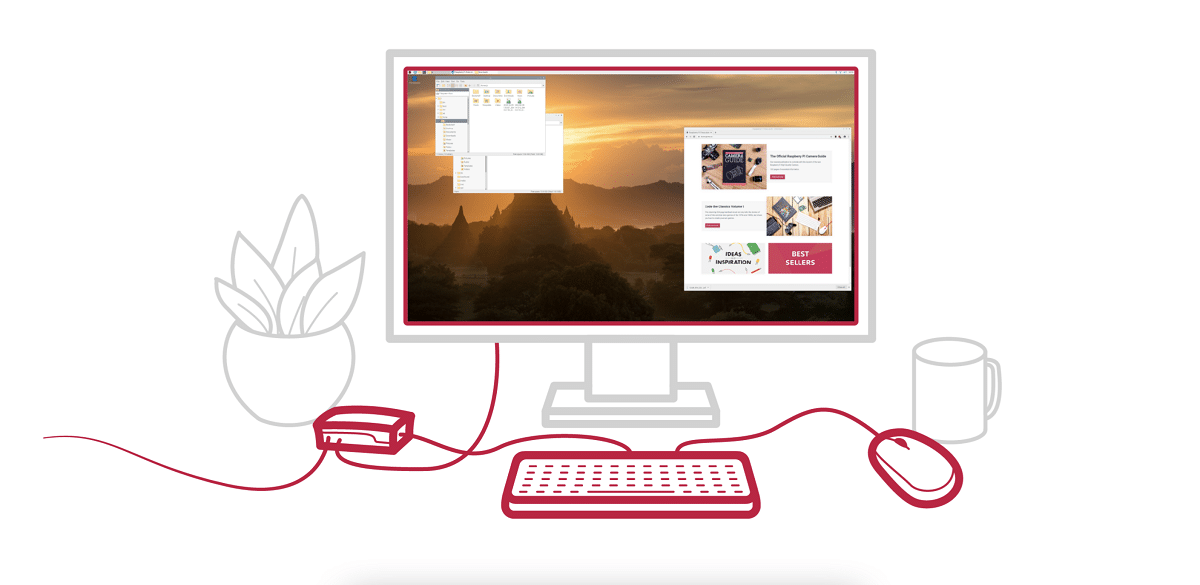
Without a doubt the Raspberry Pi is a great pocket computer that has been adapted to a large number of requirements from its users, from the zero versions to the Raspberry pi 400, basically these boards make it possible from personal projects to industrial systems.
In addition to this, something that is noteworthy about the Raspberry Pi is can work with a large number of operating systems, from Linux systems (Ubuntu, Arch Linux, Recalbox, Lakka, etc), as well as Windows, Android, among other types of systems.
But, in most cases, for users, the other alternatives are not always entirely viable and they prefer the use of the default operating system of the Raspberry Pi.
And for this the system that was created for the RPi, was once called Raspbian, which this operating system is based on the “Debian” Linux distribution.
But for a long time there was only one problem and that is that despite the fact that the Raspberry Pi line supports a 64-bit architecture since 2016 (with the release of Raspberry Pi 3), the default operating system has remained 32-bit.
However, The Raspberry Pi Foundation recognizes that many users may have reasons to prefer a 64-bit operating system, such as those who need to run closed source applications that are only available for the arm64 architecture. Another positive point that is also expected is that the performance of certain applications will improve with the change to 64-bit operation.
And the reason for talking about it is that after a year of beta testing, a stable version of the 64-bit version is finally available of the Raspberry Pi operating system, which has been in beta since May 2020.
But we have realized that there are reasons to choose a 64-bit operating system instead of a 32-bit one. Compatibility is a key concern: many closed source applications are only available for arm64, and open source ones are not fully optimized for the armhf port. Beyond that, there are some intrinsic performance benefits to the A64 instruction set: these are most visible in benchmarks today, but are supposed to be reflected in real-world application performance in the future.
The 64-bit version of this long-awaited operating system increases software compatibility for closed source applications, which are often exclusive to ARM64. Also, 64-bit Pi OS should improve benchmark performance (not necessarily real-world performance) thanks to its improved instruction set.
Unfortunately, the Pi Foundation is still working on the “desktop with recommended apps” version of the Pi 64-bit operating system.
That is why it is mentioned that if you want to update the system at this time, you must install the "Lite" version of Pi OS and manually install the important applications.
I should also note that the new Raspberry OS is based on Debian 11 "Bullseye", rather than the legacy Debian 10 "Buster".
For reference, the 64-bit Pi OS works on boards with ARMv8-A based processors like Raspberry Pi Zero 2 (BCM2710 SoC with Cortex-A53 CPU), Raspberry Pi 3 (BCM2710 SoC with Cortex-A53 CPU) and Raspberry Pi 4 (BCM2711 SoC with Cortex-A53 CPU)A53 CPU)-A72).
While legacy 1-bit Raspberry Pi 32 boards with ARM1176 CPUs come with an arm6hf build and newer 2-bit Raspberry Pi 32 and Raspberry Pi Zero boards with Cortex-A7 processors have a separate armhf build. At the same time, all three proposed builds are board compatible from top to bottom, eg the arm6hf build can be used instead of the armhf and arm64 builds and the armhf build can be used instead of the arm64 build.
Finally if you are interested in knowing more about it you can check the details in the following link.